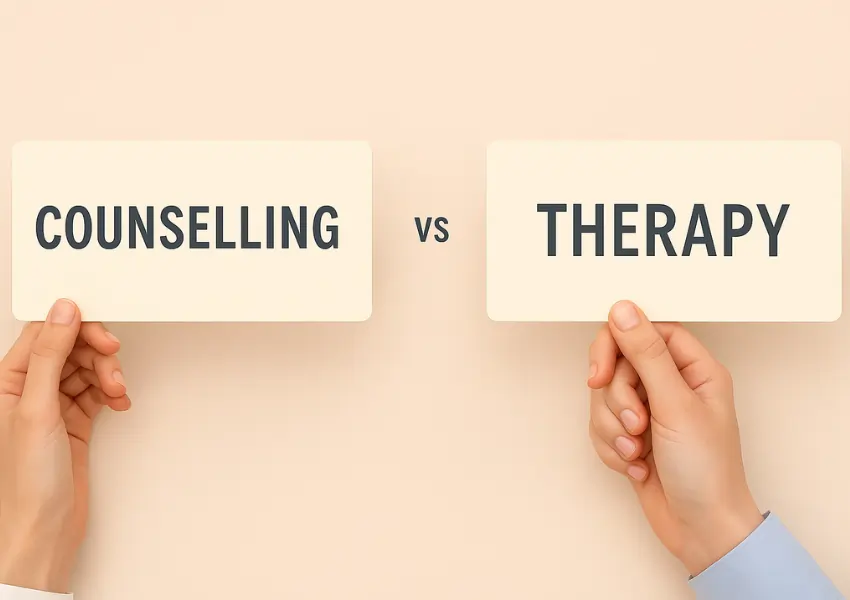Difference between Counselling and Therapy

“Counselling” and “therapy” are often used interchangeably when talking about mental health or treatments. Both are forms of ‘talk treatments’ and involve professional help from a mental health practitioner. However, the two differ in some important ways.
Let’s break them down so you can understand which one is for you.
Why the Confusion?
You might’ve seen both counsellors and therapists talk about helping you manage your emotions, improve your relationships, and make positive changes. That’s true. Both work with mental and emotional health. But the difference between counselling and therapy mostly comes down to depth, duration, and approach.
Think of it like this: you wouldn’t use a screwdriver for a nail. It’s not that the tool is wrong; it’s just not the right fit for the job. The same logic applies here.
What Is Counselling?
Counselling is a short-term, goal-oriented treatment that helps you cope with the stressors of daily life. Specific problems include overcoming a breakup, coping with the loss of a loved one, or dealing with conflict. Your counsellor will help you work through your problems by focusing on practical strategies, emotional support, and goal-setting.
A counsellor’s role is to listen, guide, and help you untangle whatever’s causing you distress. You won’t spend weeks exploring childhood patterns unless they directly connect to your current issue.
Common Reasons You May Seek Counselling:
- Relationship problems
- Grief and loss
- Work-related stress
- Life transitions (divorce, relocation, retirement)
- Low-level anxiety or mild depression
What Is Therapy?
Therapy (often called psychotherapy) is a talk treatment that dives deeper into your problems. It’s typically longer-term and helps you explore unconscious patterns, behaviours, and core beliefs. If counselling is a bandage for a cut, therapy is surgery to heal the root of the wound.
Therapists often have training that allows them to treat more complex mental health conditions like trauma, bipolar disorder, chronic depression, and many other mental health conditions. You’ll work with the therapist to explore your past, its effects on you, and learn to develop healthier coping strategies.
Common Reasons You May Choose Therapy:
- Childhood trauma
- Chronic mental illness
- Personality disorders
- Long-term anxiety or depression
- Relationship attachment issues
This is where the therapy vs counselling difference really shows. Therapy isn’t just about solving a problem; it’s about understanding who you are and why you respond the way you do.
So, What’s the Core Difference?
In a nutshell, the main difference between therapy and counselling can be summarised as:
| Aspect | Counselling | Therapy |
| Focus | Specific issue | Deeper patterns and history |
| Duration | Short-term | Long-term |
| Approach | Practical and solution-focused | Analytical and insight-driven |
| Issues Addressed | Mild or situational problems | Complex or chronic psychological issues |
If you’re still wondering, counselling vs therapy isn’t about which one is better; it’s about which one suits your current needs.
Which One Should You Choose?
Here’s the thing: it’s not really for you to decide which one to choose, especially when you’re starting your mental health journey. All mental health professionals: psychiatrists, psychologists, counsellors, and therapists are an important asset. They all have different approaches and handle different aspects of mental health. As a client or a patient, it may be hard for you to choose the one that is actually good for you, especially when there’s overlap between different mental health professionals.
Instead, you should know what to expect from different mental health professionals.
- Counsellors help if you’re facing a clear, specific challenge and want tools to cope or make decisions.
- Therapists can help if you’re struggling with deep emotional patterns, past trauma, or chronic mental health concerns.
You can always start with one and switch if needed. A good professional will let you know if your issue is outside their scope of practice and refer you to someone more suitable.
Final Thoughts
When you’re struggling with a mental health condition and looking for help, the last thing you need is confusion. You deserve to understand what you’re signing up for and why it matters. Knowing the difference between counselling and therapy can help you make smarter, more effective choices for your mental health.
Here’s the truth: both counselling and therapy can change lives. One helps you manage your current problems, and the other helps you address your past issues and reshape the future.
So whether it’s counselling vs therapy, therapy vs counselling, or just trying to figure out what is the difference between counseling and therapy, you’re already on the right path by asking the question.
You might also like:

